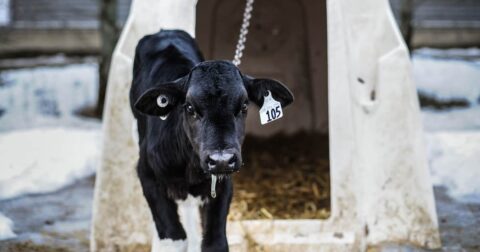Perspective
The Myth of the Cowboy and Its Enduring Influence on Public Policy
Meat Lobby•7 min read
Perspective
Prior to going undercover on factory farms, Erin Wing had witnessed and experienced all kinds of violence. It was one of the reasons she knew she would be well-suited for the job.


Words by Erin Wing
On a mild fall afternoon in rural Virginia, I stood outside of a large, dark building with my hands in my pockets, trying to appear as casual as possible. None of the clothes I was wearing were mine, and I felt a little uncomfortable in my own skin, though I didn’t dare show it.
A worker asked me if I’d ever killed a chicken before and if I knew how to do it. With as much confidence as I could muster, I told him I hadn’t but I would be willing to learn if someone showed me. I silently watched him go into the windowless building and saw that it was crowded with thousands of chickens. He picked one up and handed her to me to kill. My heart was pounding in my ears as I held this innocent live bird in my hands. I hesitated for a moment and he took her from me and broke her neck with a smile before tossing her back into the barn. Her dead body would stay there, amongst the living chickens, until another worker came by to dispose of it.
As I watched that worker so easily take the life of that chicken, I didn’t flinch. I couldn’t flinch; I had to keep my cover.
Prior to becoming an undercover investigator, I had witnessed and experienced all kinds of violence. It was one of the reasons I knew I would be well-suited for the job, and one of the main reasons I applied. I suffered abuse and trauma at the hands of those who were detached from seeing my life, my voice, as valuable.
I saw my abusers hold the same contempt for animals. I eventually saw so many similarities between my suffering and that of farmed animals, that I was compelled to become involved in the animal rights movement.
I’ve witnessed workers in the factory farming industry display the same aggression toward animals that was directed at me during my childhood. I recognized a lot of the same patterns of behavior but amplified to the highest degree. To this day, what I witnessed and documented during my undercover investigations still haunts me.
At a chicken factory farm, I saw workers impale chicks with metal nails. At Martin Farms, a dairy factory farm in rural Pennsylvania, a manager stabbed a cow in her abdomen and dragged cows with tractors through dirt and feces.
I documented the most heartbreaking acts of cruelty I ever could have imagined during my last investigation, where workers—and a manager—at Dick Van Dam Dairy used wooden canes and a metal pipe to strike cows on their way to the milking area. One cow was even dragged by a tractor, a metal clamp attached to her hips, and dangled nearly 20 feet in the air after she collapsed from exhaustion.
After two years of seeing animals suffering, it was at that dairy facility that I had finally reached the limit of what I could endure. There, brutal violence was a daily occurrence. The last effort that I felt I owed to the animals before retiring from the field for good was holding out at Dick Van Dam Dairy for a few more weeks so I could rescue a newborn calf named Samuel. I found comfort in the fact that we escaped the dark world of factory farming together.
Yet, violence is not isolated to the four facilities I investigated. It exists throughout factory farming. Some workers unleashed all their anger and aggression by physically abusing the animals. On many nights, I struggled to keep my composure, almost feeling like I was back in the same abusive environment I had escaped many years ago. And while Samuel and I now live peaceful lives, for most farmed animals, there is little hope for escape.
Animals at factory farms live a harsh existence, yet this large-scale suffering is so normalized. The animal agriculture industry wants the truth about these facilities kept secret—and most importantly, wants consumers to accept exploiting and eating animals as the norm.
Make no mistake: It is through animal suffering that this industry profits.
After being an investigator and seeing firsthand what really goes on inside factory farms, my conviction is that much stronger that farming animals for food is wrong. It made me realize that there is an interconnectedness between the way we treat all living beings—that our actions towards them impact the world in which we live.
The number of animals abused and killed for food rises by the second. And my mission is far from over.
That’s why I have dedicated my life to working toward a future where all beings are shown compassion. Out from behind the camera, now Deputy Director of Investigations for Animal Outlook, I assist our investigators in lifting up the voices of farmed animals.
It’s time to rethink our food system and stand up to this industry that perpetuates the suffering of billions of farmed animals.